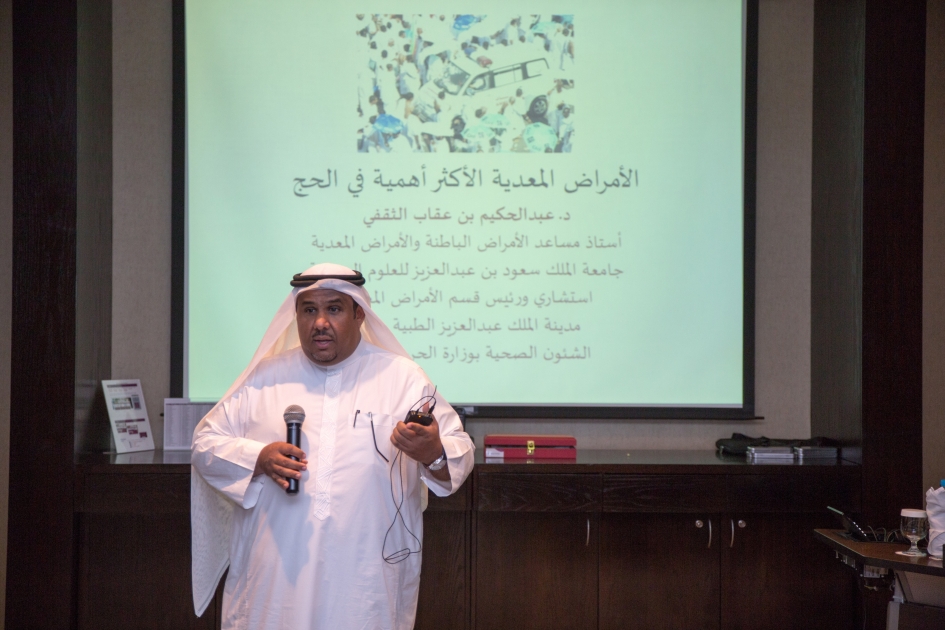
Hajj can facilitate rapid amplification and dissemination of disease among pilgrims
With globalization, pilgrim burden at the Hajj is set to rise as more people perform the pilgrimage each year. Currently, almost 3 million Muslims stay around the Holy Mosque in Makkah (Mecca) for at least 4–7 days.6 To encourage adoption of timely prevention measures against infectious diseases by the pilgrims, leading health experts in KSA came together to raise awareness and address the media on the ‘Control of infectious diseases during Hajj: Role of vaccination against pneumococcal and meningococcal disease.’
Some people come for Umrah and Ramadan, and stay until Hajj, perhaps 2–3 months altogether. Pilgrims stay in semi-permanent tents shared facilities, and are susceptible humidity and heat, and exhaustion from performing the Hajj.6 The proximity between pilgrims due to the crowded accommodation, congregation, and prayers creates an ideal environment for transmission of infectious diseases, many of which are preventable if appropriate measures are taken.
“Vaccination is critical for risk groups like elderly adults over 50 years of age and those with comorbidities like type 2 diabetes mellitus, hematological malignancy, organ and bone marrow transplantation or chronic kidney or lung diseases. Pneumococcal vaccine is recommended for adults to prevent the disease. In turn vaccination is considered one of the most successful and cost-effective of all health interventions. Meningococcal disease has been historically associated with epidemics and known to cause fatal outcomes.6, Local authorities in Saudi Arabia have made it mandatory for all travelers to have proof of meningococcal vaccination at port of entry,” said [Dr.Abdulhakeem Okab Ahmed Al-Thaqafi, Section Head and Consultant of Infectious Diseases Control at the Ministry of National Guard Health Affairs].14
Mass gathering of huge number of pilgrims coming from different countries can pose a major health concern due to importation or exportation of infectious diseases, and spread between attendees and to the local population.9
“While planning the pilgrimage, one must consider the health regulations that need to be followed. These recommendations for travelers contain all the vaccine requirements for entry into Saudi Arabia. Without proper vaccination, in addition to localized Hajj outbreaks, the resulting meningococcal carriage can also result in further dissemination in the pilgrims’ home countries, creating potential for future outbreaks internationally.6,7,9” [Dr.Abdulhakeem Okab Ahmed Al-Thaqafi, Section Head and Consultant of Infectious Diseases Control at the Ministry of National Guard Health Affairs].
During 2015 Hajj, overall vaccine coverage among international pilgrims arriving in KSA was 91%, however few countries had coverage less than 70%. Further, compliance among Saudi pilgrims may be poorer. This is because Mecca residents do not have to provide proof of vaccination, and legislation regarding other Saudi citizens is not always enforced.7
Pneumococcal disease has substantial incidence, morbidity and mortality in older adults, with increasing age over 60 and the development of underlying health conditions increasing the risk of pneumococcal infection.7 Visitors arriving for the purpose of pilgrimage (Hajj) or for seasonal work are required to submit a certificate of vaccination against meningitis issued no more than 3 years and no less than 10 days before arrival in Saudi Arabia.5
Target vaccination programs have been effective at quelling infectious disease outbreaks associated with the Hajj.9 Local health authorities have set-up vaccination facilities in each of the countries. The WHO claims that immunization is one of the most successful and cost-effective of all health interventions, preventing between 2 million and 3 million deaths every year in people of all ages.12
The Ministry of Health and Ministry of Hajj in Saudi Arabia provide regular updates about Hajj travel advice and health regulations for pilgrims and these are posted on the Ministry of Health’s website.9

























